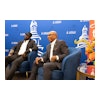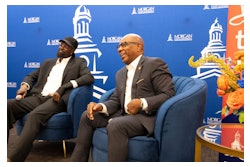Obtaining Student Visas Remains An Endurance Test
By Kristin Bagnato
International students seeking to study in the United States still face hurdles as the kinks in the new visa-granting process are ironed out. At the same time, government officials say the system is becoming easier to manage as schools and consular offices become familiar with the procedures. Education officials, however, say that while the system is improving, it cannot yet be deemed a success.
The U.S. House of Representatives Subcommittees on 21st Century Competitiveness and Select Education held a joint hearing last month about the implementation of the Student and Exchange Visitor Information System, also known as Sevis.
While applications from international students seeking to study in the United States are still declining, the rate has slowed from the post-Sept. 11 freefall. And where once lawmakers were consumed with concerns about potential terrorists gaining entry on a student visa, widely publicized fears of a U.S. “brain drain” now are leading lawmakers to question whether the Sevis system is deterring legitimate students from seeking education opportunities in America.
“The Council of Graduate Schools reported a 5 percent decline this year, following the 28 percent decline of last year,” says committee member Rep. Rush Holt, D-N.J. The United States needs to make “some effort to communicate to a broad audience that we have a more friendly and efficient effort … so students abroad know that the system has improved.”
A major issue for institutions is the unwieldiness of the Sevis database. Victor Cerda, special counsel to the U.S. Department of Homeland Security, maintains that “the technical fixes are very straightforward, usually handled in terms of days.”
Institutional officials are not so quick to agree.
There “still continues to be problems in this tracking system,” says Lawrence Bell, vice president of public policy for NAFSA: Association of International Educators, and director of the office of international education at the University of Colorado at Boulder.
“The system allows us to create records but not to correct even the simplest of errors,” Bell says. “Data fixes plague our ability to make Sevis a usable system.” He adds that while government officials do their best to be helpful, the lack of communication between the Homeland Security Department and the State Department causes trouble for the schools.
The problem is intensified when a data fix is needed and must go through Homeland Security. If the correction isn’t made in time, a student then could be thrown “out of status,” thus requiring a reapplication to State, Bell says.
Cerda said in his testimony that Homeland Security is working with schools to develop ways for them to make data fixes on their own, but that maintaining data integrity was a lingering concern.
An offshoot of post-9/11 changes that particularly affects community colleges was the rule that visitors with tourist visas could no longer pursue education while in this country. That has led to significantly decreased enrollment in English language classes, Mote said.
When asked by the committee if overall Sevis was working, Bell said, “I wouldn’t call it working,” he said of Sevis. “There’s a lot of erroneous data in the system. It has a chance for success, but at this moment I wouldn’t say it’s successful.”
© Copyright 2005 by DiverseEducation.com


















